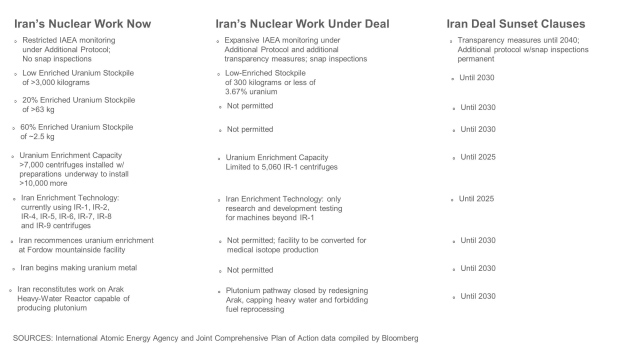Jul 13, 2021
Iran Talks Seen Withering Until August as Oil Market Heats Up
, Bloomberg News

(Bloomberg) -- Nuclear talks between world powers and Iran aren’t likely to resume until after the Islamic Republic installs its new president next month, all but eliminating the chances of an early resurrection of their accord struck six years ago Wednesday and a jump in Iranian oil exports.
A seventh round of negotiations in Vienna is expected to convene around mid-August, according to two officials familiar with the schedule, who asked not to be identified in line with diplomatic rules. A third European attache, who also requested to remain unidentified, said Iran was only expected to resume talks once Ebrahim Raisi has been sworn in as president early next month.
Another slip in the timetable could further tighten energy markets counting on Iranian oil and gas exports later this year. A dispute between two foes of Tehran -- the United Arab Emirates and Saudi Arabia -- is preventing OPEC+ from boosting supplies as major economies emerge from pandemic lockdowns.
The star-crossed agreement capped Iran’s nuclear activities in exchange for sanctions relief until then-President Donald Trump unilaterally withdrew the U.S. in 2018. Iran responded to reimposed penalties by gradually breaking the accord’s nuclear covenants and expanding the industrial infrastructure used to enrich the uranium fuel needed for power reactors or weapons. Diplomats have been trying to negotiate a way back since April.
Both the Biden administration and its European allies warned last week that they aren’t willing to wait forever for negotiations to resume. Even Iran’s typically supportive ally Russia appears impatient.
Allowing diplomacy to languish “in limbo for such a long time does not benefit” the pursuit of an outcome, Moscow’s envoy to the talks, Mikhail Ulyanov, told Kommersant in an interview published Monday. He said negotiations won’t resume before July 22 and suggested a longer delay was possible.
Disagreement over how to sequence U.S. sanctions relief and Iran’s forfeiture of nuclear capacity persist, according to Ulyanov. Tehran’s also asked for guarantees that the U.S. won’t again abandon the deal while the White House demands follow-on talks that address Iran’s missile program.
Raisi has made clear that his government will entertain no such discussions.
All the while Iran is developing its nuclear activity, which U.S. officials describe as galloping forward. Tehran has raised its uranium enrichment within a whisker of the purity required to make atomic weapons and begun laying the groundwork for thousands of new centrifuges to potentially come online this year.
One European diplomat said delaying talks until Raisi takes office doesn’t necessarily undermine the chances for a compromise. The person noted the former judiciary chief, who’s backed by Iran’s supreme leader, has so far indicated he’s willing to continue pursuing a deal that would lift sanctions and put the atomic caps back in place.
Moreover, many of the perceived advances that Iran’s nuclear scientists have made are mostly rehashed pursuits that they’d abandoned years ago, according to Robert Kelley, a U.S. nuclear-weapons engineer who directed inspections of Iraq and Libya’s atomic programs at the International Atomic Energy Agency.
“Iran’s possessed the knowledge to make uranium metal for decades,” said Kelley, referring to IAEA reports detailing production of the material as far back as 1995. “Their production of metal now is actually removing nuclear material from the pipeline that could otherwise be enriched to higher levels at short notice.”
The IAEA reported last week that Iran notified inspectors it would begin producing uranium metal at a fuel-fabrication plant in Esfahan, a city in central Iran. That announcement followed an earlier declaration in February that Iran sought to produce uranium-silicide fuel for its Tehran research reactor.
Such production of metallic uranium silicide fuel was originally developed at U.S. national laboratories precisely in order to reduce the risk that nuclear material might be used to make weapons and “has been successful in its goal of reducing proliferation risks,” according to IAEA documents.
©2021 Bloomberg L.P.


